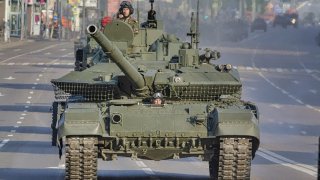Putin Is Freaked: Ukraine's Kursk Offensive Has Surprised the World
Ukraine's surprise offensive into Russia's Kursk region, involving up to 10,000 troops, has dramatically shifted the dynamics of the ongoing conflict. The operation, which captured over 1,000 square kilometers and 82 settlements, aims to force Russia to realign its forces, drawing them away from Ukrainian frontlines.
“They are taking actions to protect themselves from attacks,” Sabrina Singh, the Pentagon’s deputy press secretary, said on Thursday.
And while Ukraine’s progress into Russia has slowed in recent days, those protective actions have not. On the night of August 14, Ukraine launched its largest long-range drone attack into Russian territory to date, engaging weapons storage facilities and warehouses across four different Russian Air Force installations. Some sources suggest these attacks were aimed at reducing Russia’s available inventory of glide bombs.
Russia claimed to have shot down 117 drones and at least four missiles during the attack; the true outcome of these airstrikes remains somewhat murky.
Why did Ukraine invade Russia?
It now seems evident that the offensive has multiple overlapping objectives. As the Atlantic Council contends, the attack’s most obvious goal is to force Russia to realign after months of grueling but steady progress.
“By attacking across the lightly defended border and seizing Russian territory, Ukrainian commanders believe they can force the Kremlin to withdraw troops from the front lines of the war in Ukraine in order to redeploy them for the defense of Russia itself,” the Atlantic Council’s Peter Dickinson postulates.
This has seemingly been confirmed by former Ukrainian defense minister Andriy Zagorodnyuk, and to some extent, it seems to be working.
“Russia has relocated some of its units from both Zaporizhzhia and Kherson regions of Ukraine’s south,” Dmytro Lykhoviy, a Ukrainian army spokesman, told POLITICO on Tuesday.
The U.S.-based think-tank Institute for the Study of War (ISW) has been tracking and reporting on claims posted by pro-Russian military bloggers, who may regularly trade in Kremlin-sourced disinformation, but also often provide more detail into ongoing operations than official Russian channels. According to the ISW’s analysis, at least some Russian irregular warfare units have been pulled from the Donetsk front in eastern Ukraine to be redeployed in a defensive posture inside Russia.
“Russian military command has determined that possible disruptions to the offensive operations in northern Kharkiv Oblast and other less-critical frontline areas are an acceptable risk to adequately respond to the Ukrainian incursion in Kursk Oblast,” the ISW assessed.
But despite these changes, thus far, there’s been little shift in Russia’s overall defensive posture, even as Ukraine appointed Major General Eduard Moskalyov as the new military commandant of captured Russian territory.
“Their commanders aren’t idiots,” said The Econimist’s unnamed Ukrainian general-staff source. “They are moving forces, but not as quickly as we would like. They know we can’t extend logistics 80 or 100 km.”
What are the other implications of this offensive?
Ultimately, whether this offensive can force a redistribution of Russian forces across the conflict’s front lines depends on several factors, some of which are easier to quantify than others.
The psychological impact of Ukraine’s rapid advance into Russia, on both the Ukrainian and Russian populations, can’t be overstated. For Ukraine, the rapid progress serves as a desperately needed morale boost after years of Russia gobbling up Ukrainian territory. On the other side of the border, however, this attack has brought the war home for the Russian people, and perhaps even more importantly, shined a spotlight on Putin’s inability to defend Russian soil and sovereignty amid a conflict his government still refuses to call a war.
Even now, Moscow is referring to the new defensive effort inside Russia as a “counter-terrorism operation,” and Putin himself described the attack as nothing more than a “large-scale provocation” – both seemingly intentional ways of framing the offensive as less severe than a foreign military capturing Russian land.
To some extent, the value of this operation may ultimately be dictated by how Russia chooses to respond. If Ukraine succeeds in fortifying captured positions and digging in, Russian forces will have no choice but to respond, reducing the depth of seasoned warfighters on other frontlines throughout Ukraine. If Russia doesn’t mass enough forces to push Ukraine back, however, the seized territory could quickly become a bargaining chip in future peace negotiations.
From a geopolitical perspective, Ukraine’s attack – and Russia’s apparent inability to respond – has further reduced Russia’s military standing among global and even regional powers. Once seen as the world’s second strongest military force, Russia’s invasion of Ukraine has demonstrated conclusively that its Cold War-era warfare doctrine struggles to function on the modern battlefield; that its centralized command structure adapts on the battlefield very slowly; and Russia’s emphasis on fielding small batches of high-profile platforms aimed at securing global prestige or lucrative foreign sales, has come at the cost of significant atrophy across the breadth of its conventional forces.
While cynical to say as Ukraine continues to fight for its very survival, this entire conflict has already proven to be a massive strategic loss for Russia and certainly for Putin’s legacy. Once seen as a strategic mastermind and the only man who could return Russia to a romanticized vision of its former Soviet glory, there seems to be little hope of Putin emerging from this war as anything more than the man who sacrificed a sizeable portion of Russia’s military power and hundreds of thousands of lives, to capture about 20 percent of a nation the size of Texas that lies on Russia’s border.
What does the invasion of Russia mean for the future of the Ukraine war?
Ukraine’s rapid success in taking Russian territory doesn’t change Russia’s massive numerical advantage in troops and military hardware; undo its territorial gains; or mean Western governments are giving Ukraine free reign on how to use its Western weapon systems. Nevertheless, it does mark a significant shift in the war’s momentum. And now, with Western-sourced F-16s starting to take to the sky – something many consider to be a momentum-shifting victory in itself – the timing couldn’t be better for Ukraine to once again shock the world, and the Russian military, with what it’s capable of.
Since the conflict’s onset, Russia has been watching the clock wind down on Western support for Ukraine, knowing full well that it was only a matter of time before partisan bickering and concerns about dollars spent would sour public perceptions of the effort. All it needed to do was outlast the Western public’s attention span and financial tolerance, and once the flow of weapons and munitions dried up, Ukraine was as good as conquered.
But now, with more than 132,000 Russians displaced from their homes, and drone and missile strikes raining down deeper into Russia and in greater numbers than ever before, that waiting game may have just been turned on its head. Now, the question becomes: which population will fold first, those providing support, or those being forced to flee their homes?
While the idea of Russian civilians on the run isn’t something anyone should celebrate, it reminds me of an old story I used to tell my Marines when we’d find ourselves in a bad situation of our own creation:
A group of construction workers would meet in the parking lot of their job site every afternoon to break for lunch, and every day, one of the guys would open his lunch box and sigh with disgust.
“Egg salad sandwich again,” he’d lament, shaking his head and slamming the lunch box shut.
Finally, one of his coworkers asked him, “If you hate egg salad sandwiches so much, why not ask your old lady to make you something different?”
And he replied, “What are you talking about? I’m not married… I make my own sandwiches.”
About the Author: Alex Hollings
Alex Hollings is a writer, dad, and Marine veteran.
This article was first published by Sandboxx News.


